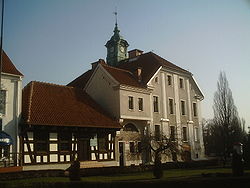Mrągowo
Mrągowo | |
|---|---|
Town | |
 Town Hall | |
| Country | Poland |
| Voivodeship | Warmian-Masurian |
| Powiat | Mrągowo County |
| Gmina | Mrągowo |
| Established | 1348 |
| City Rights | 1444 |
| Government | |
| • Mayor | Otolia Anna Siemieniec |
| Area | |
| • Total | 14.8 km2 (5.7 sq mi) |
| Population (2004) | |
| • Total | 22,600 |
| • Density | 1,478.6/km2 (3,830/sq mi) |
| Time zone | UTC+1 (CET) |
| • Summer (DST) | UTC+2 (CEST) |
| Postal code | 11-700 to 11-709 |
| Area code | +48 89 |
| Car Plates | NMR |
| Website | www.mragowo.um.gov.pl |
Mrągowo (former Polish: Żądźbork; Template:Audio-de) is a town in northeastern Poland and the seat of Mrągowo County in the Warmian-Masurian Voivodeship.
History
The Teutonic Knights constructed a wooden fortress named Sensburg near present-day Mrągowo in 1348. The settlement that began to develop near the castle in 1397 probably received town rights between 1404 and 1407, although it is verified that Grand Master Konrad von Erlichshausen affirmed town rights in 1444. Sensburg became part of the Duchy of Prussia in 1525. In the 15th and 16th centuries, the town suffered through fires and plagues. Part of the Kingdom of Prussia since 1701, Sensburg was heavily damaged during the Napoleonic Wars.
The town itself mostly remained a small hamlet in the mostly rural area around it. Agriculture, fishing and the richness of the surrounding forests provided the sources of income for the local population.
In 1871 Sensburg became part of the German Empire during the Prussian-led unification of Germany. In 1897 the town became connected to the railway system, which went from Bischofsburg (Biskupiec) to Rastenburg (Kętrzyn).
As a result of the treaty of Versailles on 11 july 1920 the Warmia and Masuria plebiscite was organized under the control of the League of nations, which resulted 99,93 % of votes to remain in Germany (33.334 total) and 0,07 % for Poland (25 total).
At the end of World War II the town was heavily damaged and lost almost 20% of its buildings. The German population was largely expelled after the war and replaced with Poles. From 1945 to 1947 the city was known by the Polonized name Żądzbork. The city's name was, like other Prussian cities, changed to the current Mrągowo in 1947, in honor of Pastor Christoph Mrongovius (1764-1855), known in Polish as Krzysztof Celestyn Mrongowiusz.
After the war Mrągowo remained a rural town with approximately 10,000 inhabitants; this number stayed almost constant until the late 1980s. In the following decade, mostly due to economic and political changes, the town gained some influence in the region and grew quickly into a regional center for economic business and tourism. Recently Mrągowo has tried to regain some of its former beauty and to represent the region. Piknik Country is an annual country music festival held in the town.
Coat of arms
The town's coat of arms derives from a local story of the 15th century. It claims that when a group of local farmers was being threatened by predators, the townspeople tracked down a fearsome bear. They were only able to shoot it in its paw, and it managed to flee to Rastenburg. Only upon its arrival there did the bear succumb to its injuries. The bear's paw was brought back to Sensburg and is honored in the coat of arms.
Gallery
-
Main Square



